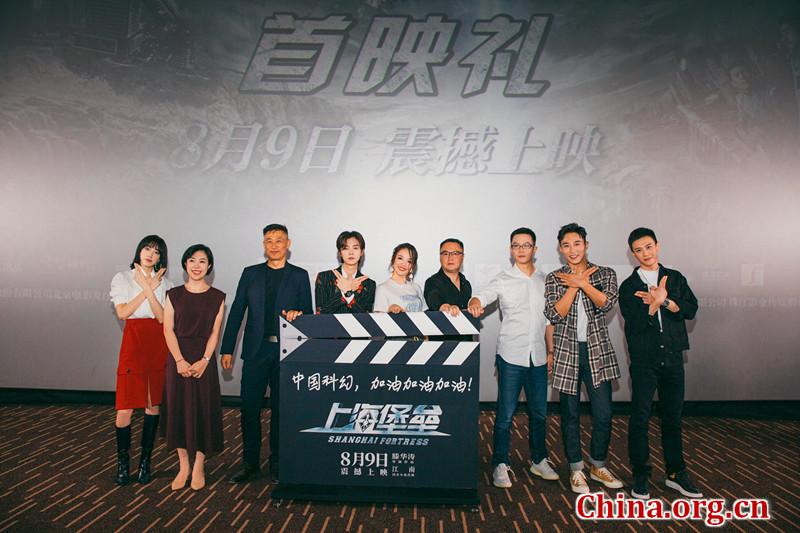'Shanghai Fortress' continues China's sci-fi odyssey
- By Zhang Rui
 0 Comment(s)
0 Comment(s) Print
Print E-mail China.org.cn, August 5, 2019
E-mail China.org.cn, August 5, 2019

The Chinese sci-fi epic "Shanghai Fortress" is another attempt to continue the country's budding craze in this genre, the director said on Sunday.
The film, directed by Teng Huatao, tells a futuristic story of how the city of Shanghai becomes humanity's last hope in the battle to defend itself against an attacking alien force that has sieged numerous cities around the globe in the quest to harvest a hidden energy source only found on Earth.
It was adapted from a popular novel of the same title published in 2009 by renowned Chinese writer Jiang Nan, who also served as the screen script writer for the film project. Many alien invasion scenes, including the giant alien mothership, are reminiscent of American sci-fi blockbuster "Independence Day" (1996).
Jiang Nan described how the script was repeatedly updated over a three-year period to make it work, expanding the war scenes and various other elements.
Teng, a director known for making urban romance films such as "Love is Not Blind" and "Up in the Wind," decided to emerge from his comfort zone six years ago, and try his hand at sci-fi, though he still managed to implant a hidden love story in the project.
China had not witnessed any successful domestic-made sci-fi blockbuster until the phenomenal "The Wandering Earth" early this year; hence, stepping into the field required his vision, ambition and investors' confidence.
"People always asked me what's the difference between 'Shanghai Fortress' and 'The Wandering Earth,' I say, Chinese sci-fi is not just about one kind," the producer Wang Chen said at the premiere held in Beijing on Sunday: "I think the biggest thing is that before 'Shanghai Fortress,' there was 'The Wandering Earth' as the precedent; but before 'The Wandering Earth,' there was no Chinese sci-fi epic at all. We are standing on the shoulder of the titan and move forward."
Wang added they were also fortunate to have a united team, including actor Lu Han and actress Shu Qi, who had strong faith in Chinese science fiction when others had doubts.
Director Teng Huatao said that, at the beginning, "for a very long time, we were fumbling and moving forward in the dark, we didn't know what the future would be, but this was the job that had to be done by someone, if not us." He had foreseen China's film market would expand rapidly and without limits so that just doing urban love comedies could not be enough to feed Chinese audiences' immense appetite.

At first, the crew thought they could hire a Hollywood visual effects team to finish the film. However, after inquiries and much research, they found that to do a Hollywood sci-fi epic on the scale of "Shanghai Fortress," their budget would be as high as $400 million, 10 times the initial estimate. Then, they decided to do it all by themselves.
"I can feel the hardship behind the film," said Frant Gwo, director of "The Wandering Earth" who was invited to the advanced screening and felt a close affinity with the "Shanghai Fortress" team," I knew behind every visual effect scene there were great efforts and much sweat involving numerous people."
"Shanghai Fortress" has many "firsts," according to producers, such as the facts that it is the first domestic-made Chinese sci-fi war film, with Shanghai city appearing for the first time as the major battlefield. This is also the first time Chinese soldiers fight aliens, and the first time for a half of a Chinese city to sink underground.
Most importantly, it is the first Chinese film comprising 90% visual effect shots made by China's own VFX companies, which means a lot to the Chinese film industry as it is short of talents in this sector. The director believed "Shanghai Fortress" would help train thousands of talents for the industry in this genre, and "we believe they will all become backbone forces for the development of Chinese sci-fi movies in the future."
He added, "It is worthwhile for us to spend six years making this wonder, and hope our new expedition could accumulate some experiences for everybody."
"Shanghai Fortress" will open in Chinese theaters on Aug. 9, 2019.






Go to Forum >>0 Comment(s)